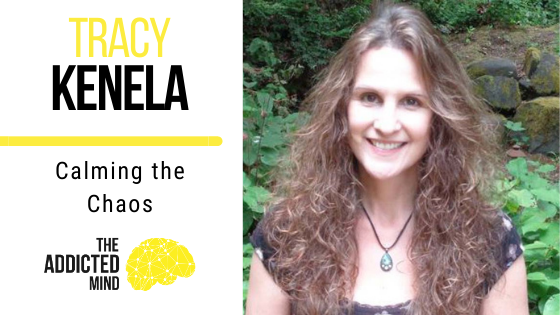On today’s episode of The Addicted Mind Podcast, Duane sits down with Tracy Kenela about “calming the chaos” and creating peace and calm in our lives.
Therapist and podcast host, Tracy discusses how she came to start studying “overwhelm” as a psychological concept. An expert in chaos, Tracy explains how chaotic factors contribute to our being overwhelmed.
Traci breaks down the different kinds of shock and responses that may manifest when our brain confronts chaos. It seems as though people get addicted to chaos or the absence of chaos. These things really just distract people from addressing the issues that matter.
If you’ve grown up in chaos, it’s possible you’re reenacting chaos as a means of coping with trauma. Tracy and Duane both urge people in this case to seek counseling because they can break the cycle of chaos if they really want to.
There is a phenomenon of victimhood in chaos addiction, too. People tend to self-create this chaos to get the right kind of attention or reactions from people around them. This is different from legitimate chaos (like the kind that just shows up in your life), but you still will need to respond to the chaos. Having a strategy to respond to chaos could save your life.
Tracy then briefly talks about how she would go about treating someone who may need help dealing with the chaos in their lives. She will validate the chaos first and then offer ways to “calm the shock.” This part is rather physical, honestly. She may offer ice or a heat pack—some people even respond to particularly strong smells. Anything to help counteract the shock.
She uses some motivational interviewing, but most of her work uses the trans-theoretical model. This model helps her to figure out at what point they’re at in regards to changing their behavior and moving away from the chaos. She then encourages her patients to take steps toward control. Even a small step like working on daily mindfulness can help you make huge gains in your focus and productivity.
What does coping with the chaos look like? It’s usually slower, Tracy says. Taking slow, deliberate steps. Taking deep breaths and moving slowly—these things will help you to become more mindful.
If you think you’re dealing with chaos, the first step is to talk to a professional to get help with relaxation tools and mindfulness practices.
Key quotes:
04:55 — “Chaos is complete disorder; unpredictable behavior…a confused mass or mixture.”
06:50 — “When the mind is in chaos, it goes into either sympathetic or parasympathetic shock.”
10:45 — “We get addicted to chaos—and all things, really—because it’s helpful on some level.”
13:45 — “Some people want to create chaos.”
16:05 — “Self-created chaos is a lot easier to fix.”
18:25 — “If they are in my office, the first thing I will do is validate them.”
21:20 — “Addicts will say ‘if I let go of this chaos, the whole world will fall apart.’”
24:15 — “I’m a huge advocate for mindfulness and self-awareness.”
27:10 — “As you slow down, your head’s going to be clearer.”
29:45 — “You’re more strategic in your decision-making without the chaos.”
33:50 — “Small hinges swing big doors.”
35:00 — “Resolve to live your life differently!”
Contact Tracy:
-
Visit Tracy’s Website at www.lokahicounseling.com
-
Listen to Tracy’s podcast anywhere, Calming the Chaos https://calmingthechaos.libsyn.com/
-
YouTube: https://www.youtube.com/channel/UC7qISnLR8T4g-bSDu-pW9LQ?view_as=subscriber
-
iTunes and Apple Podcasts: https://podcasts.apple.com/us/podcast/calming-the-chaos/id1489271578?ls=1
-
HubHopper: https://hubhopper.com/podcast/calming-the-chaos/102122
-
Tracy also created a mindfulness CD called “On This Day.” This CD teaches you how to practice mindfulness in less than 10 minutes throughout the day. Practicing mindfulness has been shown to reduce stress and increase clear thinking in times of chaos.
You can purchase the CD on Amazon at http://bit.ly/onthisdaycd. or in digital format at https://music.apple.com/us/album/on-this-day/1209386067
Follow Calming the Chaos!
Facebook Page: https://www.facebook.com/tracy.kenela.94
Facebook Group: https://www.facebook.com/CalmingTheC/
Twitter (@the_calming)
Instagram (calmingthec)
LinkedIn (https://www.linkedin.com/in/tracy-kenela-79935b5/)
You can support the Addicted Mind Podcast by purchasing through our affiliate links.
Above are affiliate links, this means that if you purchase something, The Addicted Mind Podcast will earn a commission. This commission does not cost you anything. This commission helps offset the cost of running The Addicted Mind Podcast and enables me to continue to create meaningful and helpful content. Thank you for your continued support.


